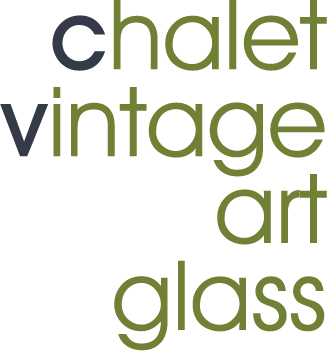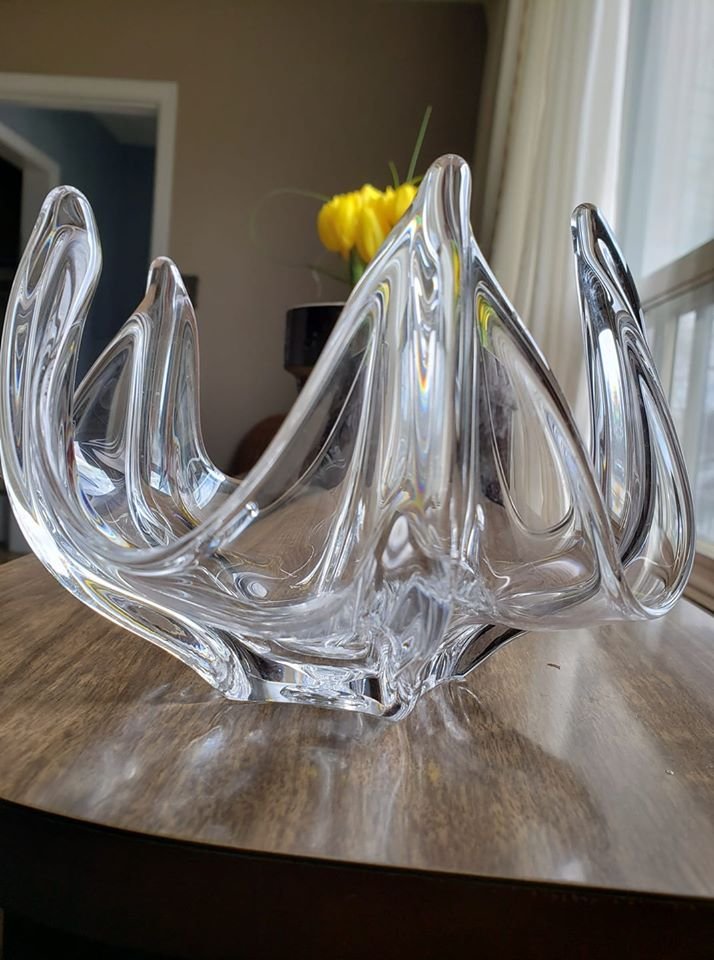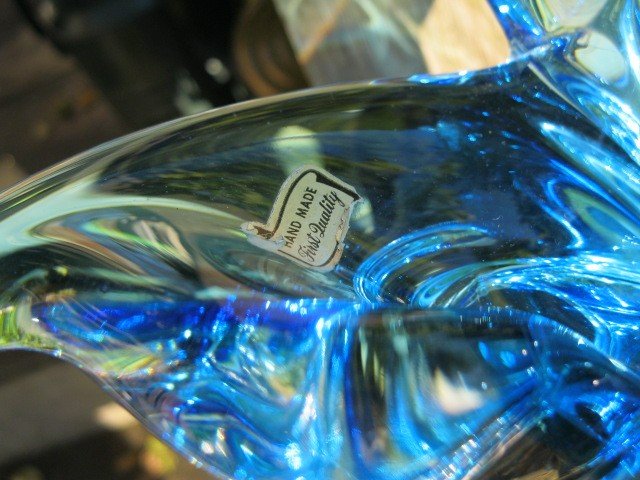Generic “Made in Canada” Labels
Quite often we find pieces made by Chalet Artistic Glass and Lorraine Glass Industries that have generic labels “Made in Canada” still attached. I am not referring to the importer/distributor or boutique reseller labels that we also see like the “Giovanni Creations” distributor’s label on Lorraine pieces or a sticker from a particular gift shop but am referring to the “country-of-origin” labels stating: “Made in Canada” or branding labels stating: “First Quality.” Sometimes, if a sticker of this type is on an otherwise unmarked piece, it does raise questions for those who are seeing one or the other for the first time. At present, we have not found generic labels of any kind on pieces by Rossi, EDAG, Mosaic Artistic Glass or Altaglass. So, let’s take a look at the roots of use of these stickers and some examples.
Canadian legislation regarding country-of-origin marking began in the late 19th century in response to import laws and practices of Great Britain and the United States. Canadian legislation was to establish that protection of domestic industry was a Canadian "national policy." These laws wanted to prevent fraud and benefit Canadian industry without a lot of complicated legalese. For example, the first Dairy Products Act, 1893, prohibited any cheese or butter being marked "Canada" unless it was made in Canada. It was then modified and expanded in 1897 to require producers to register and to mark with "Canada" or "Canadian" all cheese or butter intended for export as well. During the Chalet era, the 1970 Consumer Packaging and Labeling Act expanded import/export regulations. In addition, it prohibited any false or misleading representation likely to deceive a consumer - specifically addressing claims of product origin. While Chalet and Lorraine operated, to qualify as “Made in Canada”, the guideline was that the product had to be made of 51% domestic content as well as the product's “last substantial transformation being in Canada.” Most recently, in July 2010, new guidelines drew a distinction between "Made in Canada" and "Product of Canada." “Made in Canada” claims require a qualifying statement for any imported materials while "Product of Canada" requires that 98% (not 51%) of the total direct content and costs of the item to be domestic. Fraudulent use of Canadian origin labels is open to penalties or fines - a company making fraudulent claims about a Canadian origin of goods may incur fines of up to $10 million while an individual could be fined up to $750,000.
Generic “Made in Canada’ labels have been found on Chalet Artistic Glass, Rossi Glass and Lorraine Glass Industries forms. These would not have been placed on the glass by the companies but by resellers or distributors. I have included only ones that are truly “generic” with no information about the reseller or distributor.
To date, only 4 different country-of-origin labels have been found on pieces of Chalet glass. Here the the two most common. The first is a small round silver foil label with black lettering. Very interestingly, it has been most oft seen on pieces containing uranium.
Photographs courtesy of 50 Shades member Cathy Young.
Photographs courtesy of 50 Shades member Lise Legare-Kowalchuk.
This Chalet “4 claw” was found in a thrift store in Bermuda. Photograph courtesy of 50 Shades members David Dunkley and Geoffrey Chown.
Photographs courtesy of 50 Shades member Ian Cox.
This is the second most common generic label we have found on Chalet pieces. All have been the clear crystal bomboniere.
This very specific label has also been found on clear crystal fish bomboniere.
It is much more common to see a generic country-of-origin sticker on a piece of Lorraine. The most frequently found is the round black and gold foil label. It has beenretainned on a wide range of product - centerpieces, vases, stretches, the smaller animal figurines as well as the large bird centerpieces.
A second variety found quite often.
And a third.
There are many more varieties of the generic “Made in Canada” country-of-origin labelling. Although these particular stickers were not found on pieces of Chalet, Lorraine, or Rossi, I am including them for reference and interest’s sake. No doubt we will find more.
The clear piece below is extremely interesting in that it also retains a glasshouse sticker from Crystal Craft Industries that we see quite often. Photographs courtesy of 50 Shades member Cathy Antonyshyn.
There was no legislation around branding with regard to the use of labels promoting “hand made” or “quality.” These types of stickers were used strictly for marketing purposes and to draw attention to a perceived or true higher standard of creativity, workmanship, design, and production. Unlike the generic “Made in Canada” labels, to date, we have found this type of marking only on pieces from Lorraine Glass Industries. And, to date, only one style of sticker:
Photograph courtesy of 50 Shades member Alex Wicks.
Photograph courtesy of Walter Burton.
And very interestingly, we have also seen a remnant of this label on a Japanese piece.
Photographs courtesy of 50 Shades member Dan Lof.























